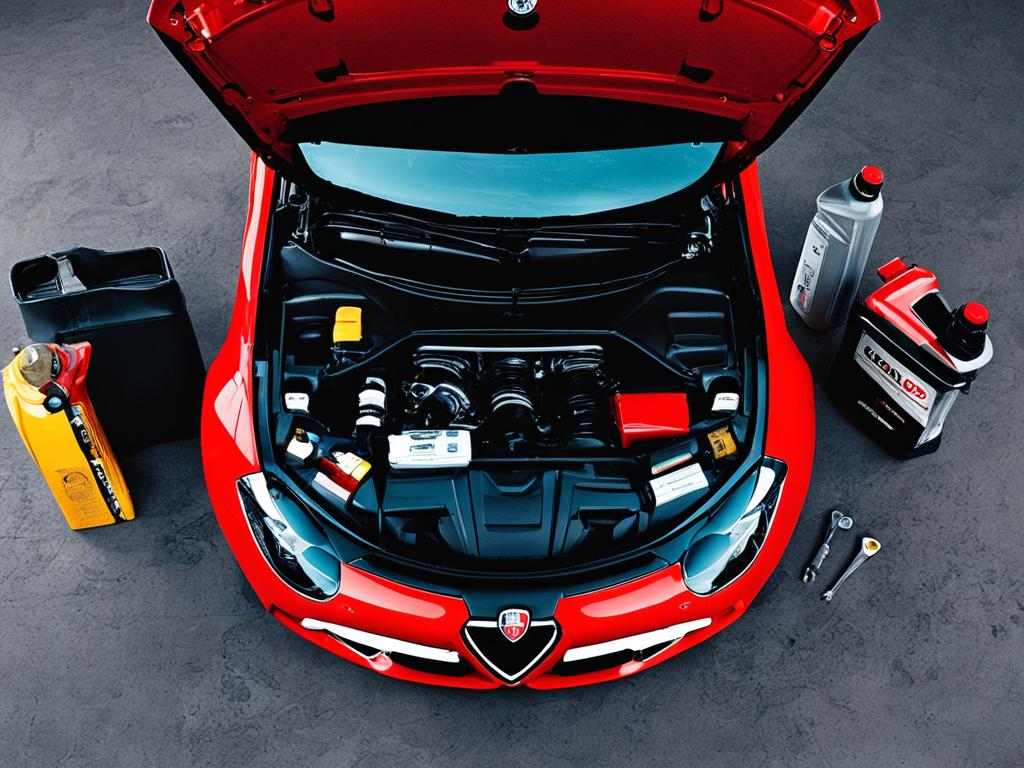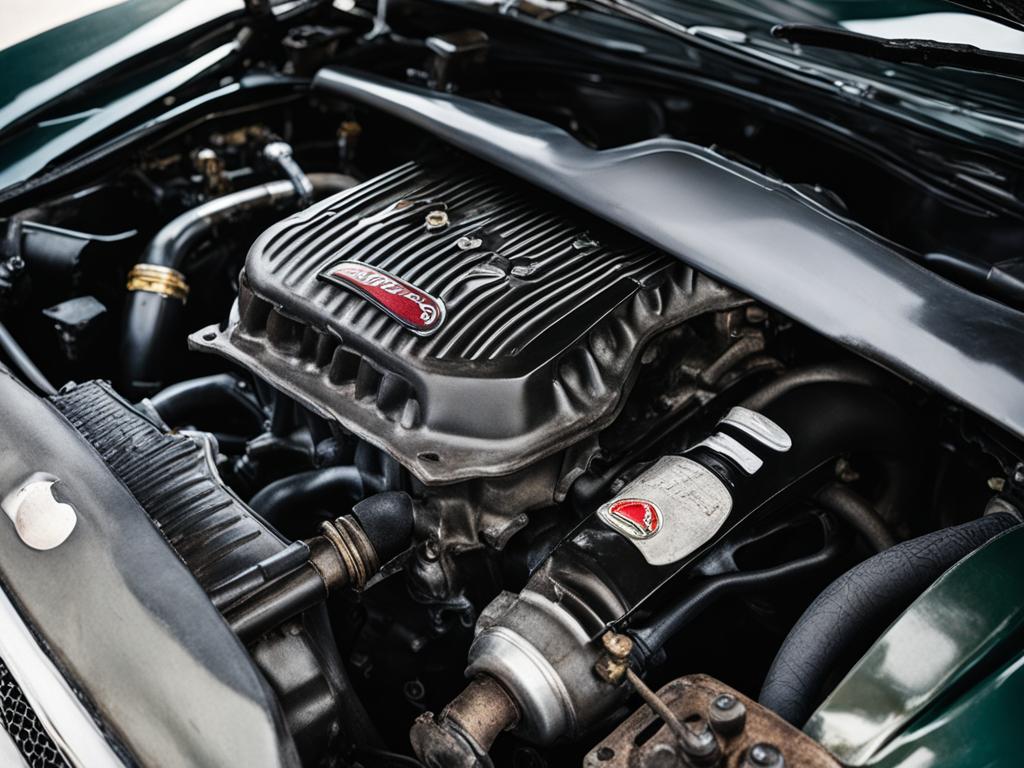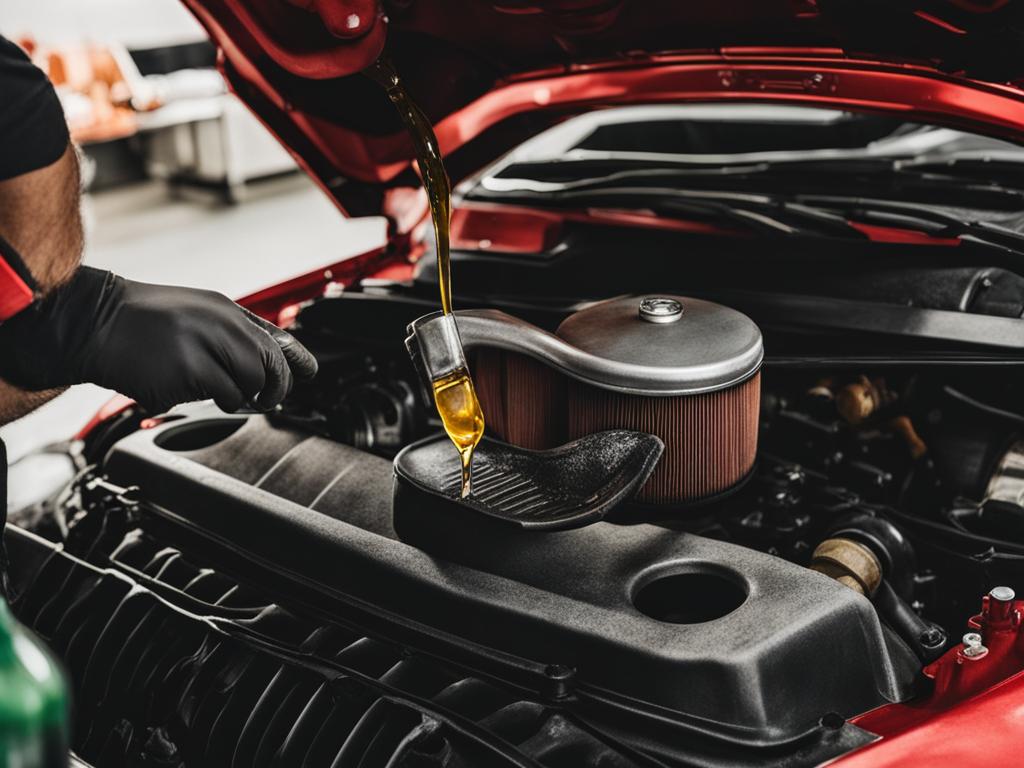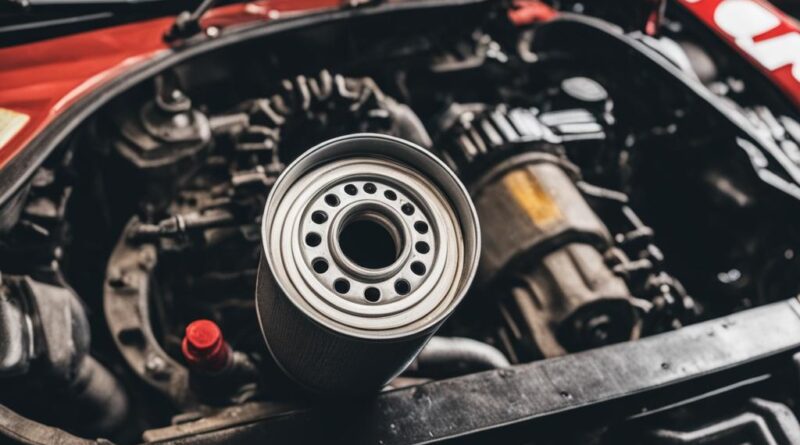Alfa Romeo Oil Change Guide – Quick & Expert Tips
When it comes to maintaining your Alfa Romeo, regular oil changes are essential. Not only do they help to keep your engine running smoothly, but they also play a crucial role in extending the lifespan of your vehicle. In this guide, we will provide you with quick and expert tips on how to perform an oil change for your Alfa Romeo, ensuring optimal performance and longevity.
Key Takeaways:
- Regular oil changes are crucial for maintaining the performance and longevity of your Alfa Romeo vehicle.
- It is recommended to have oil changes performed by certified technicians at an authorized Alfa Romeo service center or dealership.
- Using the proper oil and oil filter for your specific model is essential.
- The oil change interval can vary based on driving conditions and oil type.
- Regular maintenance, including oil changes, helps to prevent costly repairs and maintains the value of your vehicle.
Importance of Regular Oil Changes for Alfa Romeo Vehicles
Regular oil changes are crucial for keeping your Alfa Romeo in top shape. They play a vital role in lubricating the engine, reducing friction and wear, removing contaminants, and ensuring the smooth operation of the engine.
When it comes to oil changes, it is highly recommended to have them performed by certified technicians at an authorized Alfa Romeo service center or dealership. These professionals have the expertise and knowledge to use the correct oil and filters for your specific Alfa Romeo model, ensuring that the job is done correctly and effectively.
The use of genuine parts and specialized expertise offered by authorized service centers and dealerships is essential for maintaining the optimal performance and condition of your Alfa Romeo vehicle. These professionals are trained by Alfa Romeo and have access to the latest tools and diagnostic equipment, ensuring that your vehicle receives the highest level of care.
By entrusting your Alfa Romeo to certified technicians at authorized service centers, you can have peace of mind knowing that your vehicle is in expert hands. They have the in-depth knowledge and experience to identify any potential issues and provide the necessary maintenance and repairs to keep your Alfa Romeo running at its best.
Recommended Oil Type for Alfa Romeo Vehicles
When it comes to maintaining the performance and longevity of your Alfa Romeo vehicle, using the recommended oil type is crucial. Alfa Romeo vehicles require high-quality engine oils that meet the manufacturer’s specifications. Using the proper oil not only maximizes the performance of your vehicle but also protects the engine and ensures optimal fuel efficiency.
To determine the exact oil type and viscosity recommended for your specific Alfa Romeo model and engine type, consult your vehicle’s owner’s manual or contact an authorized Alfa Romeo service center. They have the expertise to provide accurate recommendations based on your vehicle’s specifications.
Using the recommended oil type for your Alfa Romeo ensures that the oil provides optimal lubrication, protecting engine components and reducing friction. It also helps prevent premature wear and damage that can result from using incorrect oil type or viscosity.
Alfa Romeo Recommended Oil Types
| Model | Engine Type | Recommended Oil Type | Viscosity |
|---|---|---|---|
| Giulia | 2.0L Turbo | Alfa Romeo 10W-60 Synthetic Motor Oil | 10W-60 |
| Stelvio | 2.9L Twin-Turbo V6 | Alfa Romeo 5W-40 Synthetic Motor Oil | 5W-40 |
| 4C | 1.75L Turbo | Alfa Romeo 5W-40 Synthetic Motor Oil | 5W-40 |
These are just a few examples, and the recommended oil type and viscosity may vary depending on the specific Alfa Romeo model and engine type. It is essential to consult the official sources for accurate recommendations for your vehicle.
Using the proper oil type recommended by Alfa Romeo not only ensures optimal performance and protection but also helps maintain the warranty coverage of your vehicle.
By using the recommended oil type for your Alfa Romeo, you can have peace of mind knowing that your vehicle is receiving the best possible care and protection. It is one of the essential maintenance steps you can take to keep your Alfa Romeo running at its best.
Steps to Perform an Alfa Romeo Oil Change
Performing an oil change on your Alfa Romeo is a crucial part of regular maintenance to ensure the optimal performance and longevity of your vehicle. While it may seem like a daunting task, following the proper steps can make the process straightforward and efficient.
- Gather the necessary tools and materials: Before starting the oil change, make sure you have all the required tools and materials at hand. This includes the correct oil and filter specified for your Alfa Romeo model.
- Raise the vehicle: Use a car jack or ramps to safely elevate your vehicle, allowing easy access to the underside.
- Locate the oil drain plug: Identify the oil drain plug on the underside of the engine. Place a catch pan beneath it to collect the old oil.
- Remove the drain plug: Carefully remove the drain plug, ensuring all the old oil drains completely.
- Replace the oil filter: Locate the oil filter and remove it. Replace it with a new, compatible oil filter.
- Install the drain plug and new filter: Once the oil has drained completely, reinstall the drain plug. Then, securely attach the new oil filter.
- Add the recommended amount of new oil: Consult your Alfa Romeo owner’s manual or the manufacturer’s recommendations to determine the appropriate amount and type of oil to add.
- Start the engine and check for leaks: Start your Alfa Romeo’s engine and allow it to run for a few minutes. Inspect for any signs of oil leaks.
- Reset the oil change reminder: If applicable, reset the oil change reminder on your vehicle’s dashboard.
The cost of an oil change for an Alfa Romeo can vary depending on factors such as the type of oil used and the location where the service is performed. To get an accurate estimate, it is recommended to consult with your local Alfa Romeo dealership or authorized service center.

Performing regular oil changes and adhering to the manufacturer’s recommended maintenance schedule will help keep your Alfa Romeo running smoothly and efficiently for years to come.
Benefits of Regular Maintenance for Alfa Romeo Vehicles
Regular maintenance is essential for keeping your Alfa Romeo vehicle in optimal condition. By following the manufacturer’s recommended maintenance schedule and having the work performed by certified technicians at an authorized Alfa Romeo service center, you can enjoy the following benefits:
- Prevent Costly Repairs: Regular maintenance helps to identify and address potential issues before they become major problems, saving you money on costly repairs down the line.
- Maintain Performance and Safety: Regular maintenance tasks such as oil changes, filter replacements, and fluid checks ensure that your Alfa Romeo continues to perform at its best and keeps you safe on the road.
- Prolong Lifespan: Proper maintenance extends the lifespan of your vehicle, allowing you to enjoy your Alfa Romeo for years to come.
- Preserve Resale Value: Well-maintained vehicles tend to retain their value better, making regular maintenance a wise investment.
Regular maintenance tasks may include but are not limited to:
- Oil changes
- Filter replacements
- Fluid checks and changes
- Tire rotations
- Brake inspections
- And more
To ensure that your Alfa Romeo remains in top shape, it is important to follow the manufacturer’s recommended maintenance schedule and have the work performed by certified technicians at an authorized Alfa Romeo service center.
Detailed Maintenance Table:
| Maintenance Task | Frequency | Recommended Mileage/Time |
|---|---|---|
| Oil Change | Every | 5,000 – 7,500 miles or 6 months |
| Filter Replacements | As needed | Check with each Oil Change |
| Fluid Checks and Changes | As needed | Check and change as specified in owner’s manual |
| Tire Rotations | Every | 6,000 – 8,000 miles or as recommended |
| Brake Inspections | Every | 10,000 – 15,000 miles or as recommended |
By staying up-to-date with regular maintenance, you can ensure that your Alfa Romeo vehicle remains in excellent condition and continues to provide you with a smooth and enjoyable driving experience.
The Importance of Using Genuine Parts for Alfa Romeo Maintenance
When it comes to maintaining your Alfa Romeo, using genuine parts is crucial. Genuine parts are specifically designed and manufactured for your vehicle, ensuring the best fit, performance, and reliability. Non-genuine or aftermarket parts may not meet the same quality and standards, potentially compromising the performance and safety of your vehicle. To ensure that your vehicle receives the highest level of care, it is recommended to have maintenance and repairs performed by authorized Alfa Romeo service centers that use genuine parts.
Using genuine parts for your Alfa Romeo maintenance offers several key benefits:
- Optimal Performance: Genuine parts are designed to meet the exact specifications and requirements of your Alfa Romeo vehicle. They are engineered to deliver the best performance and ensure that all components work together seamlessly.
- Reliability and Durability: Genuine parts are built to last, providing longevity and durability for your vehicle. They undergo rigorous testing and quality control measures to ensure that they meet Alfa Romeo’s high standards.
- Proper Fit: Genuine parts are designed to fit your Alfa Romeo perfectly. They are made with precise measurements and specifications to ensure that they integrate seamlessly into your vehicle’s existing systems.
- Warranty Protection: Using genuine parts for your Alfa Romeo maintenance may help protect your vehicle’s warranty. Alfa Romeo’s warranty typically covers repairs and replacements performed using genuine parts, offering peace of mind and added value.
By choosing authorized Alfa Romeo service centers that use genuine parts, you can have confidence in the quality, performance, and reliability of the components being installed in your vehicle. Additionally, the technicians at these service centers are experienced and trained to work specifically on Alfa Romeo vehicles, ensuring that the maintenance and repairs are done correctly and efficiently.
When it comes to preserving the performance and value of your Alfa Romeo, using genuine parts is a smart investment. Don’t compromise on quality or risk potential issues with aftermarket parts. Trust the experts at authorized Alfa Romeo service centers to provide the highest level of care using genuine parts tailored to your vehicle’s needs.

In the next section, we will provide essential tips for finding an authorized Alfa Romeo service center that you can trust for all your maintenance and repair needs. Stay tuned!
Tips for Finding an Authorized Alfa Romeo Service Center
When it comes to taking care of your Alfa Romeo, finding an authorized service center is crucial. Choosing a reputable and reliable establishment will ensure that your beloved vehicle receives the expert care it deserves. Here are some tips to help you find the right service center:
- Check for certification and accreditation: Look for service centers that are certified and accredited by Alfa Romeo. Authorized service centers have technicians who are trained and certified to work on Alfa Romeo vehicles, ensuring that they possess the necessary expertise.
- Read reviews and ask for recommendations: Seek feedback from other Alfa Romeo owners or enthusiasts to get an idea of their experiences with different service centers. It is helpful to read online reviews or ask for recommendations from trusted individuals within the Alfa Romeo community.
- Specialization in European luxury vehicles: Look for service centers that specialize in European luxury vehicles or specifically mention Alfa Romeo in their services. This specialization often indicates a deeper understanding of the brand and its unique maintenance requirements.
- Verify the use of genuine parts and equipment: Ensure that the service center uses genuine parts and has access to the latest diagnostic and maintenance equipment specifically designed for Alfa Romeo vehicles. Genuine parts provide the best fit and performance, while advanced diagnostic tools ensure accurate and efficient servicing.
By following these tips and choosing an authorized service center, you can have peace of mind knowing that your Alfa Romeo will receive expert care and high-quality service.
DIY Oil Change Tips for Alfa Romeo Owners
If you have the necessary tools and experience, you may choose to perform your own oil changes on your Alfa Romeo. Here are some tips to ensure a successful DIY oil change:
- Follow the manufacturer’s recommended oil type and viscosity.
- Use a high-quality oil filter that is recommended for your specific model.
- Use a catch pan to collect the old oil and dispose of it properly at a designated recycling center.
- Take your time and follow the proper procedure to ensure that everything is done correctly.
- Be careful not to overtighten the drain plug or oil filter, as this can cause damage.
- Keep records of your oil changes, including the date, mileage, and type of oil used.
| DIY Oil Change Tips | |
|---|---|
| Follow the manufacturer’s recommended oil type and viscosity. | |
| Use a high-quality oil filter that is recommended for your specific model. | |
| Use a catch pan to collect the old oil and dispose of it properly at a designated recycling center. | |
| Take your time and follow the proper procedure to ensure that everything is done correctly. | |
| Be careful not to overtighten the drain plug or oil filter, as this can cause damage. | |
| Keep records of your oil changes, including the date, mileage, and type of oil used. |
Remember, if you are unsure or uncomfortable performing the oil change yourself, it is always best to have it done by a certified technician.
Signs Your Alfa Romeo Needs an Oil Change
While regular maintenance is important for your Alfa Romeo, there are specific signs that indicate your vehicle may require an oil change sooner. These signs can help you identify when it’s necessary to take action:
- Dark and Dirty Oil: If the oil appears dark and dirty, it indicates that it has become contaminated and is no longer effectively lubricating the engine.
- Low Oil Level: A low oil level could suggest a leak or excessive oil consumption, which needs to be addressed promptly.
- Loud Engine or Rough Idle: If your engine is running louder than usual or has a rough idle, it could be a sign that the oil needs to be changed to ensure optimal performance.
- Oil Pressure Warning Light: If the oil pressure warning light is illuminated on your dashboard, it signifies a potential issue with the oil or oil pressure, requiring an immediate oil change.
- Reduced Fuel Efficiency or Performance: If you notice a decrease in fuel efficiency or a decline in overall performance, it may be a result of old or inadequate oil, which necessitates a change.
If you observe any of these signs, it is essential to have your Alfa Romeo inspected and serviced by a certified technician to prevent further damage and maintain the optimal performance of your vehicle.

| Signs Your Alfa Romeo Needs an Oil Change | |
|---|---|
| Dark and Dirty Oil | The oil appears dark and dirty, indicating contamination and reduced lubrication. |
| Low Oil Level | A low oil level suggests a leak or excessive oil consumption, requiring attention. |
| Loud Engine or Rough Idle | An engine running louder than usual or a rough idle may indicate the need for an oil change. |
| Oil Pressure Warning Light | If the oil pressure warning light is illuminated, it signifies a potential oil-related issue. |
| Reduced Fuel Efficiency or Performance | Decreased fuel efficiency or performance can be a result of inadequate oil, necessitating a change. |
The Importance of Regular Oil Changes for Turbocharged Alfa Romeo Vehicles
Turbocharged engines, such as those found in some Alfa Romeo vehicles, generate higher levels of heat and stress. This increased heat and stress can cause the oil to break down more quickly, which can lead to reduced lubrication and increased wear on the engine components. To ensure the longevity and performance of your turbocharged Alfa Romeo vehicle, regular oil changes are crucial.
By following the manufacturer’s recommended oil change intervals and using high-quality synthetic oils that meet the specifications for your specific model, you can help maintain the performance and protect the engine from wear and tear. Regular oil changes ensure that the oil remains clean and effective at lubricating the moving parts, reducing friction and preventing damage.
Regular oil changes also provide an opportunity to inspect other vital components of your Alfa Romeo, such as the oil filter. By replacing the oil filter during each oil change, you ensure that contaminants and debris are effectively filtered out of the oil, preventing them from circulating through the engine and causing potential damage.
Additionally, turbocharged engines often require a higher grade of oil to withstand the increased temperatures and stresses. Using the recommended synthetic oil with the proper viscosity ensures that your engine receives optimal lubrication and protection.
Overall, regular oil changes play a crucial role in maintaining the performance, reliability, and longevity of turbocharged Alfa Romeo vehicles. By staying diligent with your oil change schedule and using the right oil, you can enjoy a smoother driving experience and prolong the life of your beloved Alfa Romeo.

The Role of Oil Change Reminders in Alfa Romeo Vehicles
Alfa Romeo vehicles are equipped with oil change reminders that play a crucial role in helping you stay on top of your vehicle’s maintenance schedule. These reminders take into account various factors such as mileage, driving conditions, and the quality of the oil used. When the reminder is triggered, it serves as a timely reminder to schedule an oil change.
Regular oil changes are essential for the continued performance and longevity of your Alfa Romeo. By following the recommended oil change intervals and promptly addressing the reminder, you can ensure that your vehicle’s engine remains properly lubricated, reducing friction, wear, and the risk of potential damage.
Don’t forget to consult your vehicle’s owner’s manual or contact an authorized Alfa Romeo service center to determine the exact oil change interval recommended for your specific model.
Some newer Alfa Romeo models allow you to reset the oil change reminder yourself, while others may require the assistance of a technician. Regardless of the method, it is important to make sure that the reminder is reset after each oil change. This ensures that the reminder accurately reflects the next oil change interval and helps you stay on track with regular maintenance.
By paying attention to the oil change reminders in your Alfa Romeo and taking action when needed, you can keep your vehicle running smoothly and maintain its performance and reliability for years to come.
Conclusion
Regular oil changes are essential for maintaining the performance, reliability, and longevity of your Alfa Romeo vehicle. Whether you choose to have the oil change performed by a certified technician at an authorized service center or decide to do it yourself, following the manufacturer’s recommended intervals and using the proper oil and filter are crucial.
By prioritizing oil changes and regular maintenance, you can ensure that your Alfa Romeo continues to deliver a smooth and enjoyable driving experience for years to come. Neglecting oil changes can lead to engine damage, decreased fuel efficiency, and costly repairs down the line.
When it comes to the cost of an oil change, it can vary depending on factors such as the type of oil used and the location where the service is performed. It is recommended to consult with your local Alfa Romeo dealership or service center for an estimate of the cost.
Remember, staying on top of your Alfa Romeo’s oil change schedule is a small investment that can yield significant returns in terms of performance, reliability, and overall vehicle health. By giving your engine the care it deserves, you can enjoy many miles of exhilarating drives in your Alfa Romeo.
FAQ
When should I get my first oil change?
The manufacturer’s recommendation for the first oil change mileage is not specified, but it is generally recommended to have the oil and filter changed around 10,000 miles.
Why are regular oil changes important for Alfa Romeo vehicles?
Regular oil changes help to lubricate the engine, reduce friction and wear, remove contaminants, and keep the engine running smoothly.
What type of oil should I use for my Alfa Romeo?
Alfa Romeo vehicles require high-quality engine oils that meet the manufacturer’s specifications. Consult your vehicle’s owner’s manual or contact an authorized Alfa Romeo service center to determine the exact oil type and viscosity recommended for your vehicle.
What are the steps to perform an Alfa Romeo oil change?
1. Gather the necessary tools and materials, including the correct oil and filter.
2. Raise the vehicle using a car jack or ramps to access the underside.
3. Locate the oil drain plug and place a catch pan beneath it.
4. Remove the drain plug and allow the old oil to drain completely.
5. Remove the old oil filter and replace it with a new one.
6. Install the drain plug and new filter.
7. Add the recommended amount of new oil.
8. Start the engine and check for any leaks.
9. Reset the oil change reminder, if applicable.
What are the benefits of regular maintenance for Alfa Romeo vehicles?
Regular maintenance helps to prevent costly repairs, maintain performance and safety, prolong the lifespan of the vehicle, and preserve its resale value.
Why is it important to use genuine parts for Alfa Romeo maintenance?
Genuine parts are specifically designed and manufactured for your vehicle, ensuring the best fit, performance, and reliability.
How can I find an authorized Alfa Romeo service center?
1. Check for certification and accreditation from Alfa Romeo.
2. Read reviews and ask for recommendations from other Alfa Romeo owners or enthusiasts.
3. Look for service centers that specialize in European luxury vehicles or specifically mention Alfa Romeo in their services.
4. Verify that the service center uses genuine parts and has access to the latest diagnostic and maintenance equipment for Alfa Romeo vehicles.
What are some tips for performing a DIY oil change on my Alfa Romeo?
1. Follow the manufacturer’s recommended oil type and viscosity.
2. Use a high-quality oil filter that is recommended for your specific model.
3. Use a catch pan to collect the old oil and dispose of it properly at a designated recycling center.
4. Take your time and follow the proper procedure to ensure that everything is done correctly.
5. Be careful not to overtighten the drain plug or oil filter, as this can cause damage.
6. Keep records of your oil changes, including the date, mileage, and type of oil used.
What are some signs that my Alfa Romeo needs an oil change?
1. The oil is dark and dirty, indicating that it has become contaminated.
2. The oil level is low, which could indicate a leak or excessive oil consumption.
3. The engine is running louder than usual or has a rough idle.
4. The oil pressure warning light is illuminated on your dashboard.
5. You are experiencing reduced fuel efficiency or a decrease in overall performance.
Why are regular oil changes important for turbocharged Alfa Romeo vehicles?
Turbocharged engines generate higher levels of heat and stress, making regular oil changes even more crucial to ensure that the oil remains clean and effective at protecting the engine components.
What is the role of oil change reminders in Alfa Romeo vehicles?
Oil change reminders help you keep track of when your vehicle is due for an oil change based on factors such as mileage, driving conditions, and the quality of the oil used.




